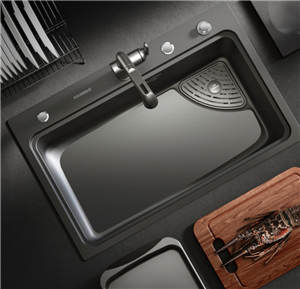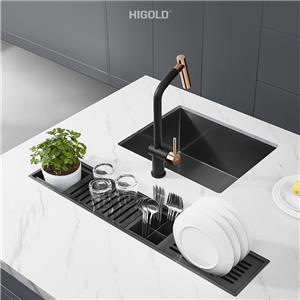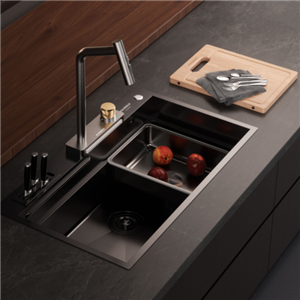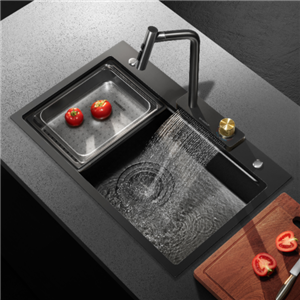Can boiling water be poured into a composite sink?
In modern kitchens, sinks are one of the most common and important household facilities, and composite sinks have gradually become the first choice for many families and commercial kitchens due to their durability, stain resistance and aesthetics. However, as consumers' understanding of composite sinks continues to deepen, many people have begun to pay attention to the specific performance of composite sinks in daily use, especially the question of "Can boiling water be poured into a composite sink?" This question has become the focus of consumers' attention.
We often see boiling water used for cooking in the kitchen, especially when cooking, brewing drinks or washing hot pots, it is inevitable to pour boiling water into the sink. Although composite sinks have a certain heat resistance in design due to their high temperature resistance, whether boiling water can be poured into them is still a question in the minds of many consumers.
So, can composite sinks withstand the impact of boiling water? Will pouring boiling water affect its service life? This article will provide detailed answers from many aspects such as material characteristics, design principles, and usage precautions to help consumers understand the relationship between composite sinks and boiling water.
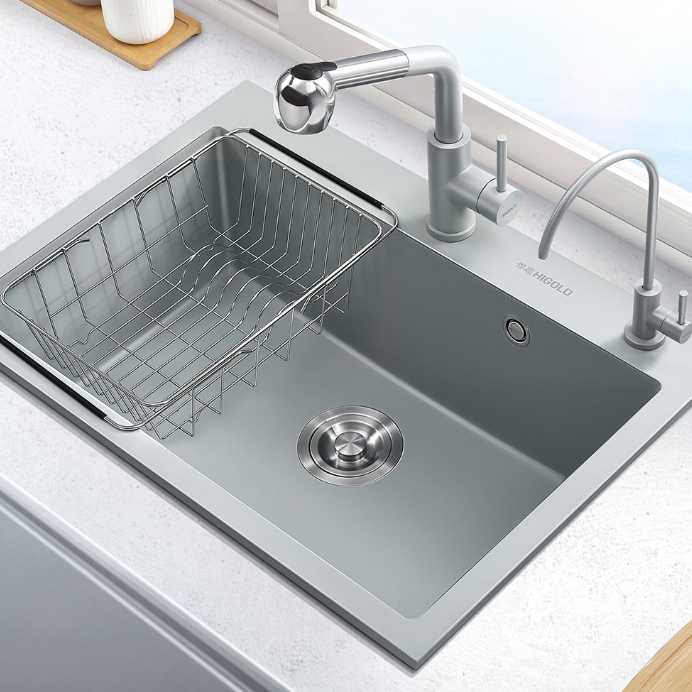
What is the heat resistance of composite sinks?
The material of the composite sink is usually a composite of quartz sand, resin, ceramic, stainless steel and other materials. These materials are combined together during the manufacturing process through high-temperature die-casting, injection molding and other processes to form a product with strong pressure resistance, stain resistance and wear resistance. These characteristics of the composite sink make it one of the most popular choices in modern kitchens. However, the question that consumers are concerned about is whether the composite sink can still maintain its original performance and appearance when facing boiling water, a high-temperature liquid.
Quartz composite sink
The quartz composite sink is a composite of quartz sand and resin materials. The hardness of quartz sand is high, which makes the sink more wear-resistant and scratch-resistant. The resin provides good bonding and elasticity for the overall structure of the sink. The quartz composite sink has strong heat resistance and can maintain its structural stability within a certain temperature range, but if it is subjected to high temperatures for a long time, it may cause deformation or cracking on the surface of the sink.
Ceramic composite sink
Ceramic composite sinks are usually composited with ceramics and other materials. Ceramics themselves have good high temperature resistance, so they can withstand temperatures up to several hundred degrees. However, due to the relative fragility of ceramics, drastic temperature changes may cause cracks or breakage on the ceramic surface. Therefore, when pouring boiling water into the ceramic composite sink, although it can withstand hot water for a short time, it still needs to avoid sudden temperature changes.
Stainless steel composite sink
The stainless steel composite sink uses a combination of stainless steel and composite materials, which has strong corrosion resistance and high temperature resistance. Compared with other types of composite sinks, stainless steel composite sinks have better adaptability to hot water and can withstand the impact of boiling water for a long time. However, excessively high temperatures may still cause discoloration or certain chemical reactions on the surface of the sink, especially when exposed to boiling water or other high-temperature liquids for a long time.
Resin composite sink
The high-temperature resistance of the resin composite sink is relatively weak because the resin material has a limited range of adaptability to temperature. Overheated water can cause the resin material to deform, age or peel off, so during use, try to avoid pouring boiling water directly into the resin composite sink to extend the service life of the sink.
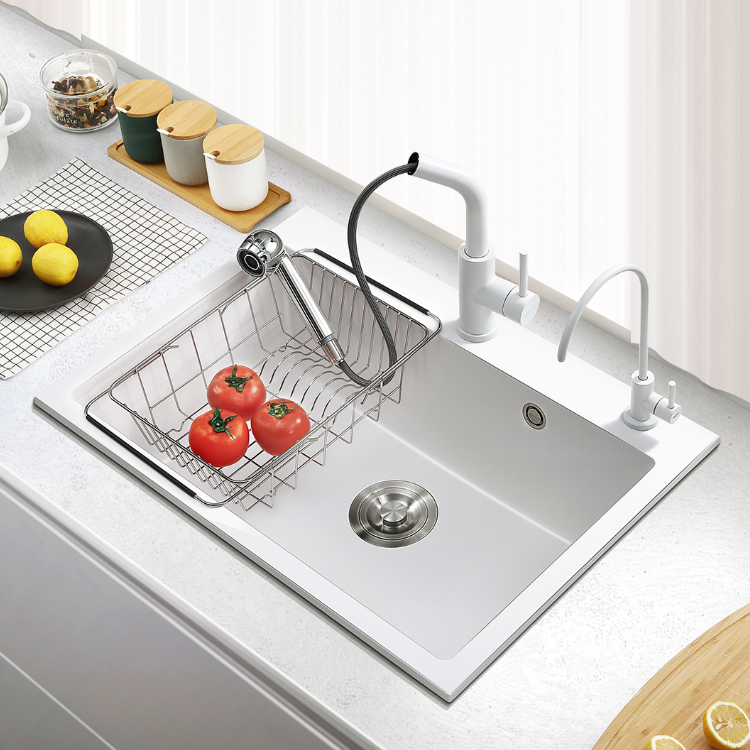
What is the effect of boiling water on the composite sink?
Thermal expansion and thermal shock
The temperature of boiling water is usually around 100℃. Although composite sinks have a certain degree of heat resistance, there is still a risk of thermal expansion and thermal shock. When boiling water is suddenly poured into the sink, the surface and internal structure of the sink will expand thermally. If the temperature change is too drastic, it may cause cracks, peeling or deformation on the surface of the sink. Especially in some cases with large temperature differences, the material of the composite sink may crack due to uneven expansion, affecting the appearance and use of the sink.
Material aging and thermal damage
Long-term contact with boiling water may cause aging of the composite sink material. In particular, resins and certain synthetic materials may discolor, become brittle, crack, etc. when exposed to high-temperature water flow for a long time. Although quartz and ceramic composite sinks have a strong adaptability to high temperatures, frequent pouring of boiling water may still accelerate the wear of the surface coating of the sink over time and reduce the service life of the sink.
Differences in heat resistance
Composite sinks of different materials have different heat resistance. For example, quartz composite sinks can withstand the impact of hot water at a certain temperature, but if boiling water is poured in frequently, small cracks may appear on the surface of the sink. Ceramic composite sinks have strong resistance to high temperatures, but if the temperature changes suddenly, cracks are prone to appear. While stainless steel composite sinks have strong heat resistance, long-term contact with boiling water may still cause discoloration or corrosion on the surface of the sink. Therefore, for composite sinks, avoiding pouring boiling water into them for a long time, especially the part exposed on the surface of the sink, is still the key to protecting the sink.
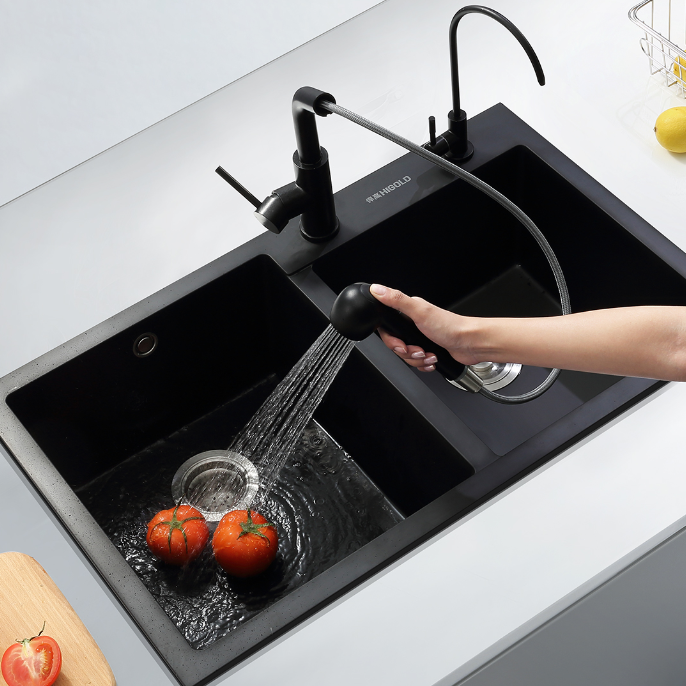
How to use composite sinks correctly to avoid high temperature damage?
Avoid pouring boiling water directly
Although many composite sinks have strong heat resistance, in order to avoid thermal expansion or surface damage caused by excessive temperature difference, consumers should try to avoid pouring boiling water directly into the sink. If you need to pour hot water, you can wait for the water temperature to drop slightly before pouring the water into the sink.
Pour in hot water slowly
If you really need to pour hot water into a composite sink, it is recommended to disperse the water flow and pour it slowly into different areas of the sink to avoid concentrating in one place. This can reduce the pressure on the sink surface caused by concentrated heat and reduce the risk of damage to the sink surface.
Install temperature isolation pads or protective pads
For kitchens that often use boiling water, it is recommended to place temperature isolation pads or protective pads at the bottom of the sink. This isolation pad can effectively prevent hot water from directly contacting the sink surface, thereby reducing the risk of thermal damage.
Avoid long-term high temperature exposure
When using a composite sink, you should avoid letting hot water stay in the sink for a long time. If there is a high-temperature liquid in the sink, it is recommended to clean the sink as soon as possible and rinse with cold water to help the sink cool down quickly and reduce the impact of temperature differences on the sink.
Check the condition of the sink regularly
Although the durability and heat resistance of the composite sink are good, it is still necessary to regularly check the surface and interior of the sink for cracks, discoloration or aging after long-term use. If any damage is found, measures should be taken to repair or replace it in time to avoid affecting the service life of the sink.
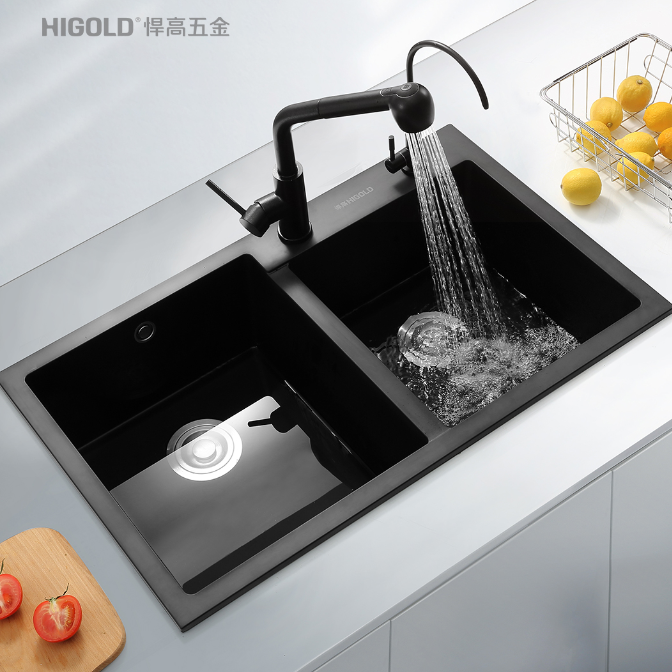
Higold Group: High-Quality Kitchen Sinks and Faucets
Higold Group Co., Ltd. is a leading manufacturer of stainless steel Inox sinks and kitchen faucets, offering both wholesale and customized solutions to meet global demand. We prioritize quality control, using the latest automation and robotics to maintain competitive prices. With a wide variety of products and over 500 patents, we’re the supplier you can trust for kitchen hardware. Get in touch today for personalized quotes and special promotions!

